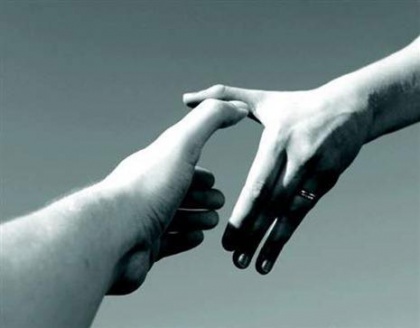Giving and Receiving: The Principle Of Reciprocity

When you give something without expecting anything in return, it’s known as altruism. But, up until what point is it really fair to give without receiving? Remember that “what goes around comes around” in life. You may not get anything in return for what you did today, but you’ll see the rewards tomorrow.
How does the reciprocity work?
The most important foundation of reciprocity is based on the intention to give back what other people have given us in the past. To better understand this, maybe we should look at an explanation that takes us way back…
Man has had to share to be able to survive. From knowledge to tools, food or shelter, it was always due to the generosity of a special few that kept others alive.
This didn’t die down after the cavemen (luckily) and still stands today. Since birth, we innately carry a feeling of “indebtedness” when someone does something for us.

But there’s more, because we blow our minds trying to think of a way to pay that debt as soon as possible (and surpass it.)
Unfortunately, a lot of people take advantage of that feeling of “guilt” that overcomes us when we owe someone a favor. These people base themselves on the premise of “doing something for someone so they will feel obligated to do something for me.”
And that’s where “induced” reciprocity comes in, for lack of another term. Meaning, that they look for ways to help other people for the sole reason that they’ll then owe us a favor.
But watch out!
The first known people to take advantage of this feeling of guilt were the Krishnas. They would go out on the streets and give away flowers to the pedestrians, and proceed to say they were raising funds for their foundation. Since the people had already received a gift (the flower), they felt obligated to make a donation to the cause. To this day, this technique is used with other objects as well, such as a book, a drink or a pen.
If we expand to other territories, several studies from the eighties show that the act inviting someone you’ve just met for a drink causes a feeling of indebtedness, which is mostly sexual. This seems a little illogical and farfetched for the 21st century, but four decades ago, it wasn’t.

For it is in giving that we receive.
— Francis of Assisi
Are there ever good intentions behind “giving and receiving”?
Some would say yes, without thinking twice. But the truth is that we’re always expecting something in return. It’s not to say we want a gift or something material, but giving makes us feel like better people; like we’ve done our “good deed” for the day, like we can feel proud about our actions, etc.
So, we are expecting something in return. Maybe we’ll save the moment to throw everything we’ve done for them in their face, or in a more mystical sense, expect a higher power to compensate us for our attitude, be it God, the Cosmos, Karma, etc., or simply expect them to be there if we’re in need.
Is it Possible to be 100% Altruistic?
Every day, it’s becoming rarer to think about our brother or sister, help them, and put ourselves in the other person’s shoes… Maybe it would be better if, instead of offering everything we have, we started taking care of the details of everyday life.
We don’t have to give away all our material things and go hungry so others can eat. Meaning, you don’t have to suffer to be an altruist.
We can start by giving more to the people around us, with simple actions like giving up your seat on the subway, letting someone older go first, tying your child’s shoes, making dinner for your family, or carrying your partner’s bag.
Of course you’ll get something in return: someone else’s happiness, gratitude and affection. Don’t you think that’s enough of a gift?
When you give something without expecting anything in return, it’s known as altruism. But, up until what point is it really fair to give without receiving? Remember that “what goes around comes around” in life. You may not get anything in return for what you did today, but you’ll see the rewards tomorrow.
How does the reciprocity work?
The most important foundation of reciprocity is based on the intention to give back what other people have given us in the past. To better understand this, maybe we should look at an explanation that takes us way back…
Man has had to share to be able to survive. From knowledge to tools, food or shelter, it was always due to the generosity of a special few that kept others alive.
This didn’t die down after the cavemen (luckily) and still stands today. Since birth, we innately carry a feeling of “indebtedness” when someone does something for us.

But there’s more, because we blow our minds trying to think of a way to pay that debt as soon as possible (and surpass it.)
Unfortunately, a lot of people take advantage of that feeling of “guilt” that overcomes us when we owe someone a favor. These people base themselves on the premise of “doing something for someone so they will feel obligated to do something for me.”
And that’s where “induced” reciprocity comes in, for lack of another term. Meaning, that they look for ways to help other people for the sole reason that they’ll then owe us a favor.
But watch out!
The first known people to take advantage of this feeling of guilt were the Krishnas. They would go out on the streets and give away flowers to the pedestrians, and proceed to say they were raising funds for their foundation. Since the people had already received a gift (the flower), they felt obligated to make a donation to the cause. To this day, this technique is used with other objects as well, such as a book, a drink or a pen.
If we expand to other territories, several studies from the eighties show that the act inviting someone you’ve just met for a drink causes a feeling of indebtedness, which is mostly sexual. This seems a little illogical and farfetched for the 21st century, but four decades ago, it wasn’t.

For it is in giving that we receive.
— Francis of Assisi
Are there ever good intentions behind “giving and receiving”?
Some would say yes, without thinking twice. But the truth is that we’re always expecting something in return. It’s not to say we want a gift or something material, but giving makes us feel like better people; like we’ve done our “good deed” for the day, like we can feel proud about our actions, etc.
So, we are expecting something in return. Maybe we’ll save the moment to throw everything we’ve done for them in their face, or in a more mystical sense, expect a higher power to compensate us for our attitude, be it God, the Cosmos, Karma, etc., or simply expect them to be there if we’re in need.
Is it Possible to be 100% Altruistic?
Every day, it’s becoming rarer to think about our brother or sister, help them, and put ourselves in the other person’s shoes… Maybe it would be better if, instead of offering everything we have, we started taking care of the details of everyday life.
We don’t have to give away all our material things and go hungry so others can eat. Meaning, you don’t have to suffer to be an altruist.
We can start by giving more to the people around us, with simple actions like giving up your seat on the subway, letting someone older go first, tying your child’s shoes, making dinner for your family, or carrying your partner’s bag.
Of course you’ll get something in return: someone else’s happiness, gratitude and affection. Don’t you think that’s enough of a gift?
This text is provided for informational purposes only and does not replace consultation with a professional. If in doubt, consult your specialist.







